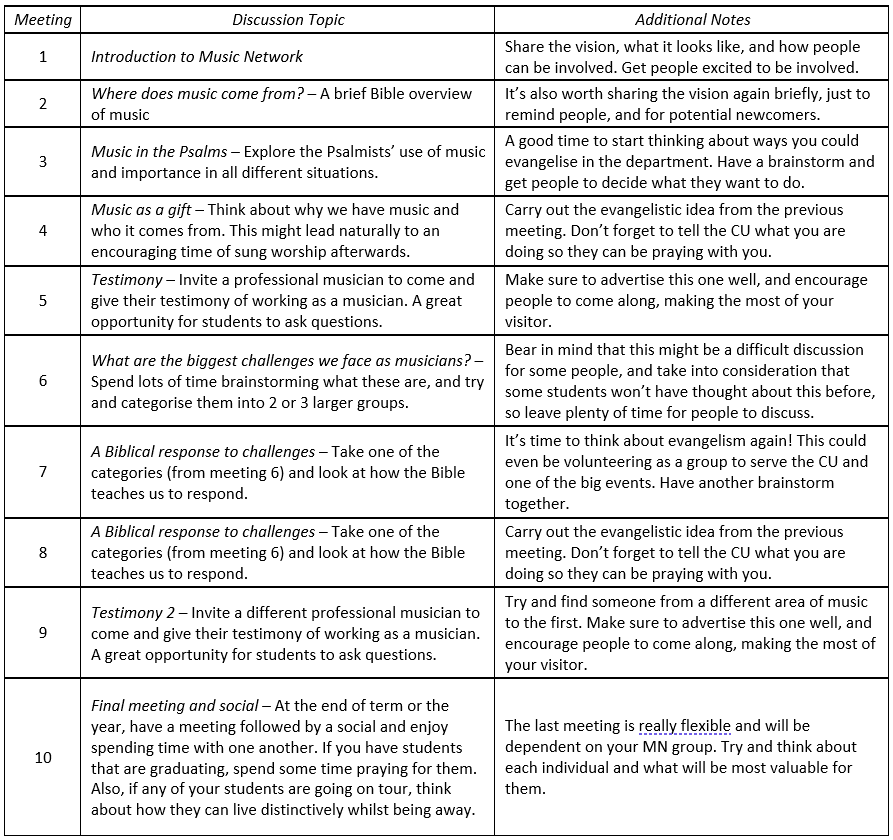Here is a quick guide to the key things to think about as you set up a Music Network group at your university. The UCCF Music Network exists across the UK to help students live for Christ in the world of music. Local Music Network groups in your own universities can be a great place to equip you for that, as well as being a place of encouragement to each other. Whether there are just two or three Christians in your faculty, or a whole bunch of you, hopefully this guide will help you to make the most of the opportunity that a Music Network group brings. First things first:
Prayer
It is so important to start off this project with prayer. It is vital to seek God first in our planning process and to seek His will for the group. He will direct and guide us, and open doors for us where necessary, which may be essential, especially if working alongside a Student Union. Prayer is integral at every part of the process, and beyond. Start praying for the students that will come to your meetings, and for those you can reach out to in your department.
Logistics
There’s a lot to think about to get your Music Network group up and running. First of all, chat with your CU Staff Worker and CU committee members, so that they know what you are doing, and can support you in it. Music Network groups are meant to be part of the wider university Christian Union, not a musicians-only replacement for it, or operating entirely separately from it.
Next up is to think about when and where you want the group to take place. If you go to your department office and ask for a full schedule of seminars, lectures, and ensemble rehearsals, you can try and find a time that most people will be free. Late afternoon is often a freer time, before people have evening commitments. On or near campus are the best locations as students may have to come straight after lectures. To book a room on campus, it might be necessary to ask the committee to help you out.
Finally, it is important to think about the frequency of the meetings. Fortnightly seems to work well as it is frequent enough that people don’t forget about it in the busyness of student life, whilst not adding too much to people’s diaries. This means you will meet roughly 4-5 times a term. If this is too much initially, you could start off by having monthly meetings, just to get the ball rolling and encourage people to start coming.
The meetings themselves
What you choose to do in the meetings is entirely up to you! There are key things to include such as a Bible discussion and prayer. Optional activities could be (a) an icebreaker, which are particularly helpful in the first few meetings, (b) sung worship, which is a good way to join in fellowship with one another, and focus hearts before reading the Bible, and (c) of course, notices, which keep people informed about plans and wider Music Network events etc. You can ask different people in the group to lead the icebreakers and worship, so that everyone has a chance to be involved if they want to. You could even have a snack rota...
The Bible discussion can vary hugely between meetings. Try making them interactive, allowing people to discuss. It is great to bring in outside speakers to help you in this, but you can do it yourself. Try and have a good balance between broader and narrower topics, and don’t be afraid to make it really specific. Below is an outline of potential topics that you could do throughout the year:

Publicity
Perhaps one of the more difficult things to think about is how you are going to publicise the group. As it is for Christians who study music, there are some useful outlets where you can give notices, such as in the main CU meetings. You can also communicate through word of mouth in the music department, especially as in ensembles, you get to know people so quickly.
Another thing to think about is social media. It can be really helpful to create a private Facebook group to update members of the group with times and dates of meetings, and notices for the week. Ask the CU committee if you can add a link for this on the main CU page.
Wider UCCF Music Network Support
The wider UCCF Music Network can also help you establish a local group, and has even produced a term-plan for you to follow if that's easier for you, complete with all the administrative tasks needed to run it smoothly. Do email network co-ordinator Tom Chevis at tchevis@uccf.org.uk if you'd like a copy.
What's more, throughout the year, the wider Music Network runs events that equip you and should help you to be able to run a successful local group. These events are vital for any leaders, and useful for all musicians as they equip you for your area of study. They are also a great opportunity to meet with music students from around the country, to get to know each other and compare notes to help each other. Encourage your whole group to come to these events as they are really valuable.
There is also this website with its useful resources, including blog posts, interviews and podcasts with musicians, various articles from students and staff workers, and book reviews, so it's a really excellent resource. Do make the most of it!
So, while this outline isn’t exhaustive, I hope it has helped you begin thinking about how to start a Music Network group at your university!

